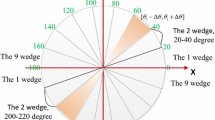Abstract
The objective of this paper is to get a visual characterization of time evolution images, in particular, synoptic maps taken from Meteorology. Preliminary tasks required before image processing are reviewed. Two different types of numerical descriptors are extracted for characterizing the images, the called low level numerical descriptors, and the high level corresponding ones. The latter will be subsequently used for prediction tasks, meanwhile the former will be used for classification tasks. Three different relevant information sources in the images are identified as their low level descriptors. These are defined by the local density and orientation of the isobar lines, and the number of centres of high (H) and low (L) pressure. Regarding the high level descriptors, two main features are taken into account. The different procedures carried out to extract the previous descriptors for our images of interest are discussed.
Preview
Unable to display preview. Download preview PDF.
Similar content being viewed by others
References
Crespo, J.L., Bernardos, P., Zorrilla, M.E., Mora, E.: Preprocessing phase in the PIETSI project (Prediction of time evolution images using intelligent systems). In: Moreno-Díaz Jr., R., Pichler, F. (eds.) EUROCAST 2003. LNCS, vol. 2809, pp. 651–659. Springer, Heidelberg (2003)
Kass, M., Witkin, A., Terzopoulos, D.: Snakes: active contour models. Int. J. Comput. Vision 1(4), 321–331 (1988)
Waller, W.G., Jain, A.K.: On the monotonicity of the performance of a Bayesian classifier. IEEE Transactions on Information Theory 24(3), 392–394 (1978)
Naya, A.: Meteorología superior. Espasa Calpe (1984)
Sonka, M., Hlavac, V., Boyle, R.: Image processing, analysis and machine vision. International Thomson Computer, London (1996)
Shalkoff, R.J.: Digital Image Processing and computer vision. Wiley, New York (1989)
Jähne, B.: Digital Image Processing. In: Concepts, Algorithms and Scientific Applications, 4th edn. Springer, Heidelberg (1997)
González, J.: Visión por Computador, Paraninfo, Madrid (1999)
Cole, R.A. (ed. in chief): Survey of the State of the Art in Human Language Technology. Cambridge University Press, Cambridge (1996)
Young, I.T., Gerbrands, J.J., van Vliet, L.J.: Fundamentals of Image Processing. Delft University of Technology, The Netherlands (1998)
González, R.C., Woods, R.E.: Digital Image Processing, 2nd edn. Prentice Hall, Englewood Cliffs (2002)
Author information
Authors and Affiliations
Editor information
Editors and Affiliations
Rights and permissions
Copyright information
© 2005 Springer-Verlag Berlin Heidelberg
About this paper
Cite this paper
Crespo, J.L., Bernardos, P., Zorrilla, M.E., Mora, E. (2005). Meteorological Image Descriptors. In: Moreno Díaz, R., Pichler, F., Quesada Arencibia, A. (eds) Computer Aided Systems Theory – EUROCAST 2005. EUROCAST 2005. Lecture Notes in Computer Science, vol 3643. Springer, Berlin, Heidelberg. https://doi.org/10.1007/11556985_15
Download citation
DOI: https://doi.org/10.1007/11556985_15
Publisher Name: Springer, Berlin, Heidelberg
Print ISBN: 978-3-540-29002-5
Online ISBN: 978-3-540-31829-3
eBook Packages: Computer ScienceComputer Science (R0)




